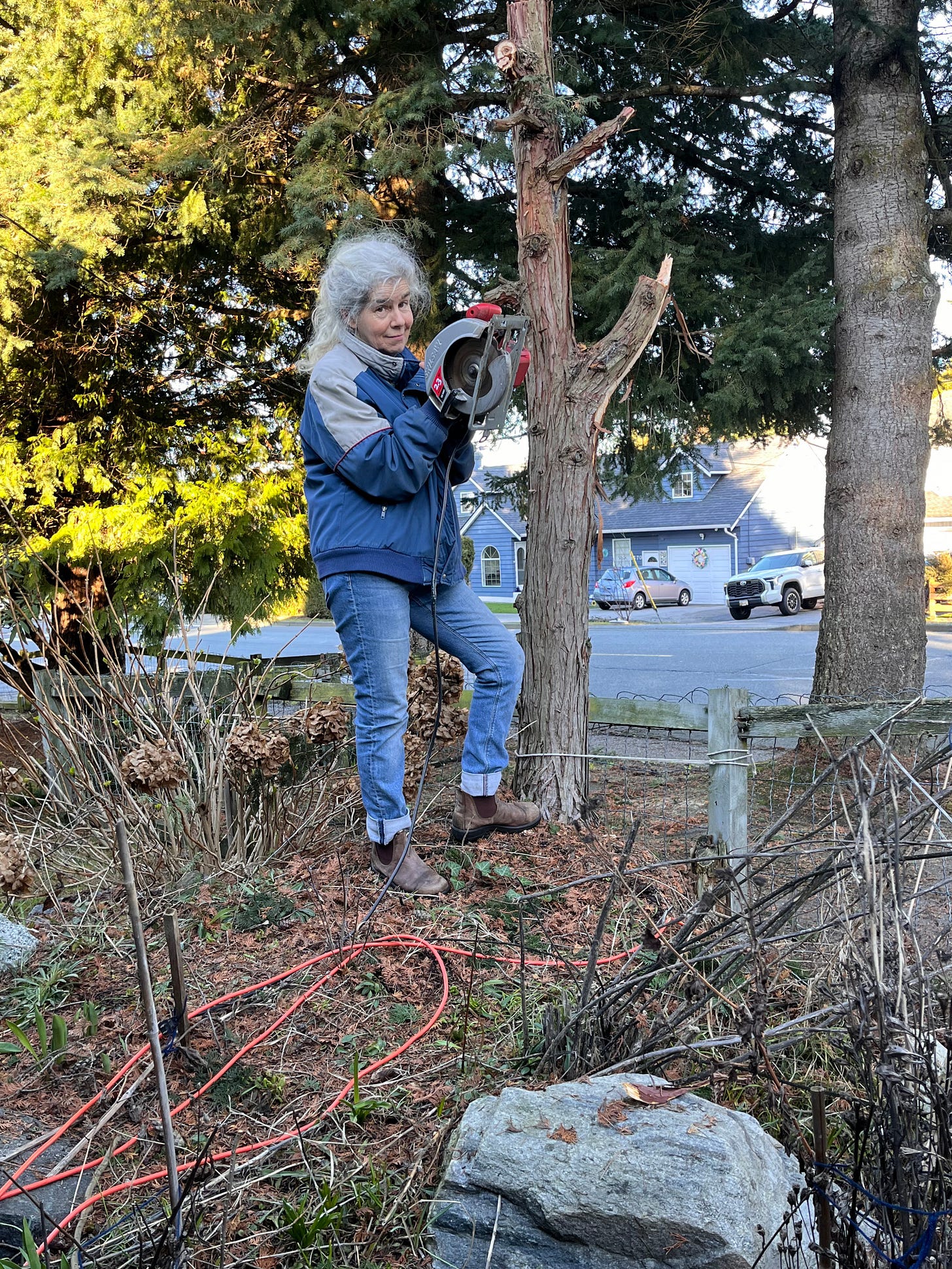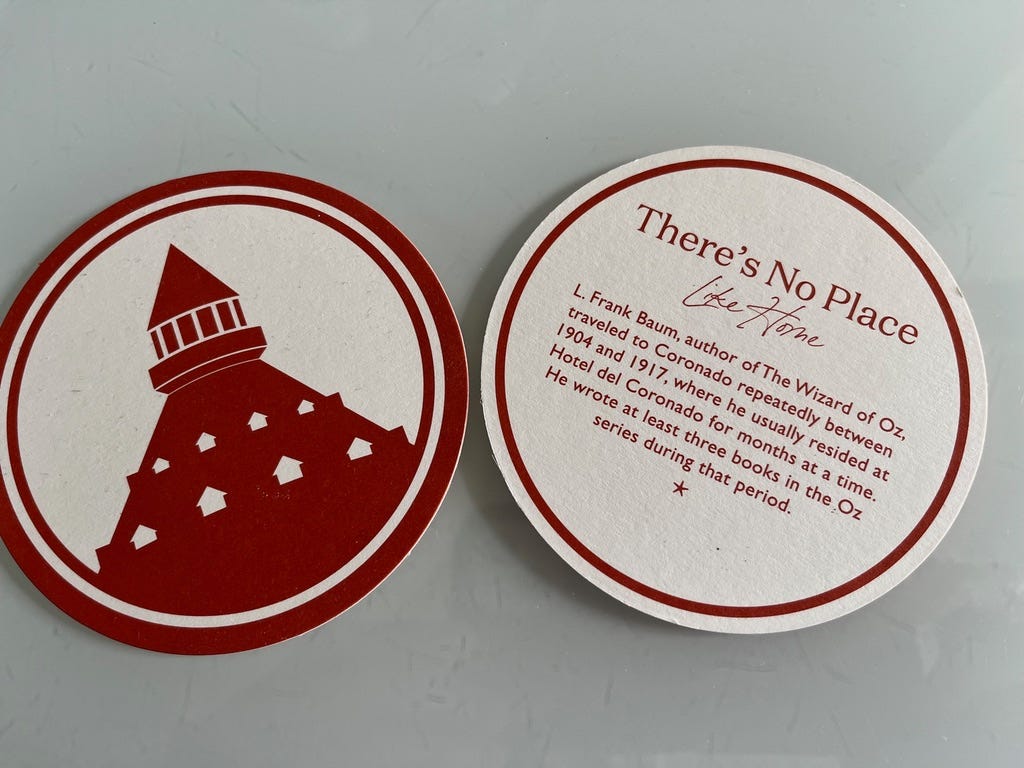Amid “prune” of tree in my mother’s yard —
“Word” has returned from my agent. Remember my series of posts from July as I was wrapping up the novel for adults I’ve been working on for several years?
(Check out the “Alison’s dedicated writing week - a process journal of sorts” section in the 2022 Index, if you haven’t read.)
So this next step is to work with my agent’s comments before we send it out. Of course, it’s up to me. But I understand her thoughts, and want to give the story its best chance of getting out into the world.
Her feedback is to cut. At the moment, the novel is almost 112,000 words. She’s suggesting I get it to under 100k and—ideally—closer to 90k.
Even my bad math tells me that to get it to 90k is cutting 1/5 or about 20%.
I asked her if any part stands out as slower paced or dragging, and the one part that came to her mind is only a 15 page section of the 400 pages. And she doesn’t want the whole 15 pages gone.
So this is an exercise in proportionate cutting. That is, throughout the ms. (manuscript), I need to cut 12-20%. Scenes are to be kept; story-threads are all doing their bit. It’s down to words, phrases, sentences, like going through a full garden bed and finding the weeds here and there. For me, this is the toughest kind of cutting, beyond nit-picky. But the story will become a tighter read. For the record, she says the character development is “deft”—it makes it so much easier to work on the tough stuff when you know what is working! It also lets me know not to mess with the qualities that create this development-piece.
First step: isolate this 15 page section and cut as much as possible. Beyond 20%. Then return to the whole. That’ll be a good way to get started.
I isolated this one section, creating a new file in order to focus and watch the word count. I’ve spent the morning on that, and labelled the file “working on sections.” I copied/pasted the 15 pages and cut almost 900 of the 3786 words. When I’m finished (after I go for a walk and then cut further!) I’ll paste it back into my next draft of the whole, labelled with the date. I’ll clean out this “working on” file for tomorrow’s chunk. This is going to keep me from thinking of the ugly whole of this task—which feels overwhelming at this point. A little organizing-head-game I need to play with my self.
The July file is intact, my safety blanket. You know… just in case we find an editor who asks for a longer version. (Any gamblers here? Want to bet on that?)
And I’ve closed the July file so I don’t inadvertently return to it and make a great mess.
Types of “cuts” I’m finding:
—“was leaning” becomes “leaned”
—anywhere I’m tiptoeing around POV issues. So words like “maybe” and “appeared”… I’m being careful. I need to stay within my POV, but sometimes such bits can overly complicate and add words. So I’m trimming such IF I CAN.
—at times I have consecutive sentences saying almost the same thing, particularly in dialogue. There’s a fine line between attempting to capture the rhythm of natural dialogue, and going beyond what’s needed. When I have the luxury of word count, I might not worry about it, but when tightening… whew. It begins to feel much like the energy I feel when working on a picturebook—the form in which every single word needs to be doing triple duty. This is why this work is exhausting.
E.G.: Keith slowed Hopper; hitting the animal would be the worst thing that could happen right now. Still he couldn’t see. “You sure?”
“Yes!” Charlie was irritated. “You went right by her. What’s wrong with you? Why can’t you see her?” (40 words)
Cut to: Keith slowed Hopper; hitting the animal would be the worst that could happen right now. Still he couldn’t see. “You sure?”
“You went right by her! Why can’t you see her?” (31 words)
Note the cuts: the word “thing,” the “showing” of “Charlie was irritated” (note the added exclamation mark to show the irritation.) I could change “would be” to “was” but am reluctant to; I don’t want to mess with the subjunctive.
I’ve managed to cut almost 25%.
E.G.: What was it that Felicity had said about Hopper? Good things happen; Hopper will help you find what you need… (20)
Cut: What was it Felicity had said? Good things happen; Hopper’ll help you find what you need… (16)
I’ve cut the repetitive “about Hopper,” and contracted in dialogue, a natural place to contract.
Focus. This requires incredible focus, and a refining of creativity. This is not raw first draft work. (Oh, I’ll be so ready for THAT when I’m finished THIS.)
Note: I’ll be including such examples each day through this process.
Downsizing
The process reminds me of when I down-sized my home from 2600 sq feet, with a massive yard and garden, to a half-duplex of 1100 sq feet. I threw away, gave away, and sold 70% of my belongings. And here’s the key: in the last two weeks, the last two days, I was tossing furniture and belongings in ways I could not have envisioned in the first month of that task. (I had 2.5 months to do that work.) If you’ve done such work, and need to cut a manuscript, get into that same head-space as much as you can.
(In the above paragraph, as I started to cut, I thought I would choose between cutting “and garden”—but I liked the detail of “garden” as well as “yard” and so opted to cut the word “massive”—the two of yard and garden created a sense of “more than…” These are the types of choices to make when cutting without ruining the essence. of the thing.)
Find your setting
It does help to be in San Diego at the invite of my friend, at the lovely Del Coronado, to do this work, sitting on a balcony with palm trees waving about. You might not be able to do this, but do find a good—for you—working space that has a sense of “reward” about it. Do walks, take breaks; take a break ANY TIME the process starts to slow. When you return to the work, you will see more to cut. That I will bet on.
I’ve set myself a goal of cutting 2000 words per day for the six days I am here. Can I do it? Let’s see…
I am in the best company, for writers. Check out the underside of the coaster:
I’ll keep you posted on this surgical step in the re-write process!
~~~








Omg cutting down is SO HARD! Esp massive word counts like this one. I expect, if my book gets agented at 105k words, I will have to do the same. So THANK GOD you wrote this post sharing the inner workings of your process and just the sheer rigour of having to do this at all!
My ms was already cut down quite a bit. I also found a joy in it! Chopping out scenes which didn’t lend themselves to the plot, as well as slashing those adverbs and repeated lines (so many!).
Excellent examples and discussion of why you were doing the cuts. The "why" matters.